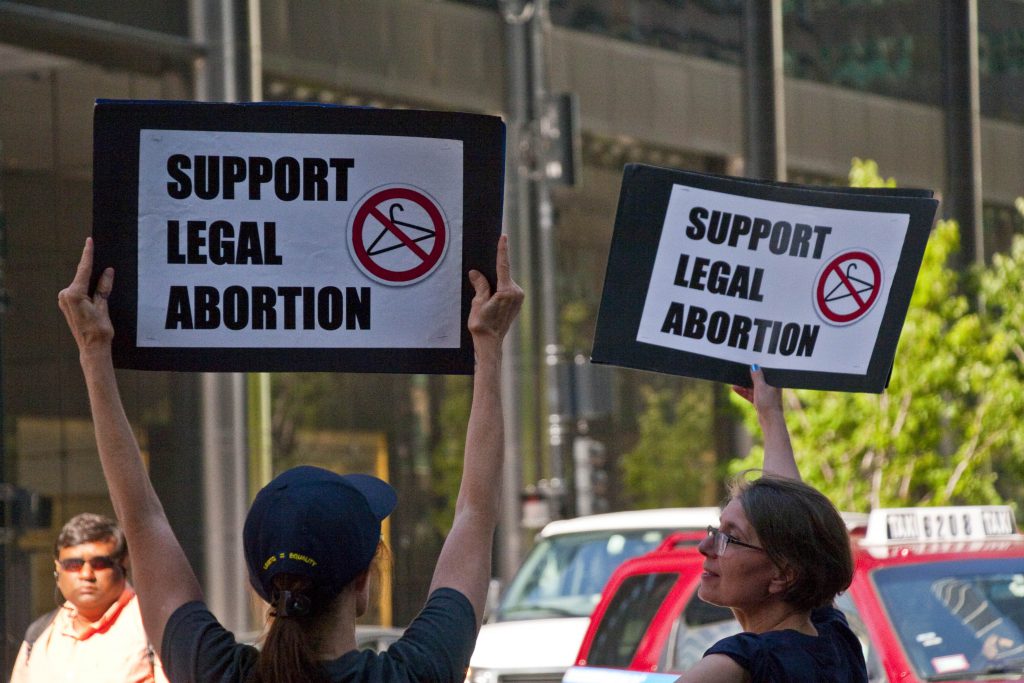State Law Makes Abortion a Felony
If U.S. Supreme Court overrules Roe v. Wade as many predict, 1849 Wisconsin law will be activated.

Support legal abortion. Photo by Charles Edward Miller. (CC BY-SA 2.0).
The conservative majority dominating the U.S. Supreme Court agreed Monday to take up a Mississippi abortion case and the move has sparked fears among women’s health advocates that this decision signals the beginning of the end of legal abortions.
If the court overturns Roe v. Wade, abortion will become a felony in Wisconsin. In 1849, the year after statehood, Wisconsin officials passed a law making abortion a felony with no exception for cases of rape, incest or to protect the health of the woman.
The case that the U.S. Supreme Court made the decision to review is Dobbs v. Jackson Women’s Health Organization, which challenged whether a Mississippi law baring abortions after the 15th week of pregnancy is constitutional. The court will consider the law in its next term, which begins in October and runs through June 2022, but most likely in the fall, say court observers.
“Never forget that [Sen. Mitch] McConnell and others mocked us and gaslit us through the [Brett] Kavanaugh fight for claiming that legal abortion was in jeopardy,” NARAL President Ilyse Hogue tweeted after the Supreme Court announced it would hear a direct challenge to Roe v. Wade. “They knew. They lied. We knew. We fought. And we’re so far from done fighting.”
Criminalizing abortion
Under the 172-year-old Wisconsin law, doctors and health care professionals assisting someone in obtaining an abortion are guilty of committing a crime.
Subeck and other pro-choice colleagues have introduced a bill for several sessions now — including most recently in January — that would remove the 1849 law from Wisconsin’s books. Democratic lawmakers are pushing the Abortion Rights Preservation Act as they have witnessed states passing laws that are designed “to work their way up to the Supreme Court to overturn Roe,” says Subeck.
According to NARAL Pro-Choice America, Wisconsin has among the most “severely restrictive” abortion laws in the nation.
Only eight other states have laws banning abortions that can’t be enforced due to Roe. Still other states have more recently passed what’s known as “trigger laws” that would kick into place banning abortions should Roe v. Wade be overturned. Those states are Arkansas, Idaho, Kentucky, Louisiana, Mississippi, North Dakota, Missouri, Tennessee, South Dakota and Utah.
Road to reconsidering Roe
Last June the high court struck down a Louisiana law, mirroring a 2013 Wisconsin law signed by then-Gov. Scott Walker but blocked by an appellate court, that required doctors who perform abortions to have admitting rights at a nearby hospital. In certain locations this has the effect of eliminating the only abortion provider in a state. In Wisconsin at the time, it would have shut down two of four clinics
The Supreme Court news site SCOTUS Blog describes the element at the heart of the Jackson Women’s Health Organization case is whether all pre-viability abortion bans are unconstitutional. That is the question that the justices announced that they would take up on Monday after delaying a decision a dozen times. Other questions raised in the case are not under consideration, according to SCOTUSblog’s Amy Howe.
Wisconsin Rep. Mark Pocan (D-Black Earth) argues that based on Supreme Court rulings, the “case should have already been dismissed” because abortion is a constitutional right. He stated on Twitter: “If they can’t defend constitutional rights, then Congress must act to protect reproductive freedom.”
Women’s health advocates say women with means to pay for an abortion and take time off from work or child care will travel out of state, although Subeck points out that a woman with cancer or a blood clot or other condition might not be able to travel. Many others would likely turn to illegal providers. “We saw what happened pre-Roe,” adds Subeck. “Women die.”
Reprinted with permission of Wisconsin Examiner.




















